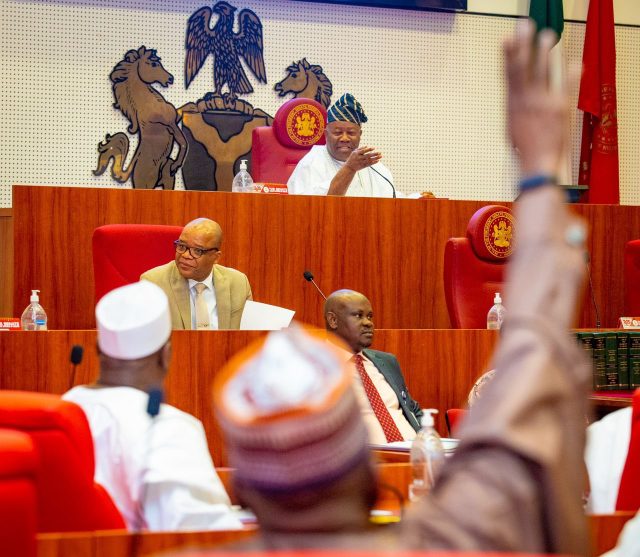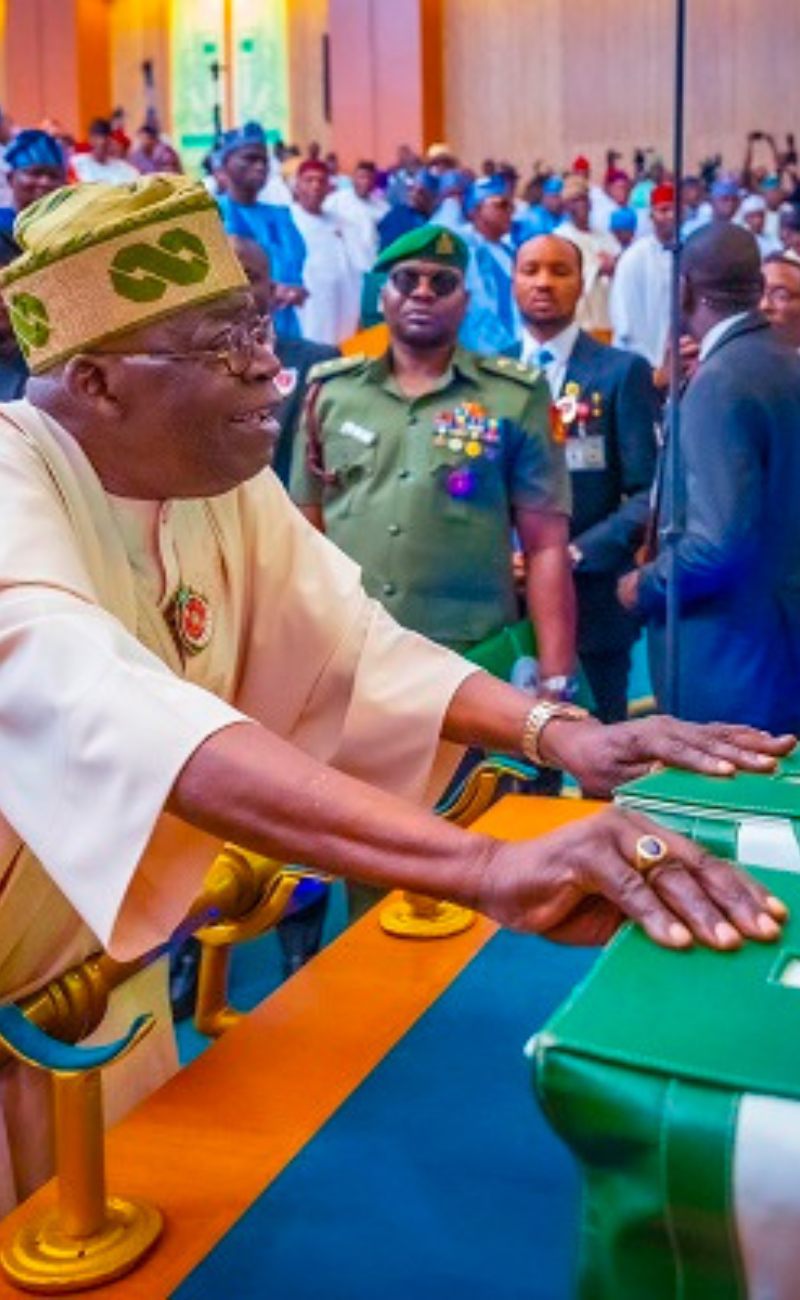The term admission racketeering recently invaded the Nigerian media space, after a report on allegations of the practice was brought before the Senate.

Like job racketeering, admission racketeering can simply be described as money for admission. It is a practice or situation, whereby persons particularly, staff of tertiary institutions, demand money from prospective students in exchange for admission.
This exchange can also be said to be willing extortion, given that the students, or in some cases, parents/guardians of the students, agree to the offer to pay money for the admission. Worst is, such students do not qualify for admission to study certain courses but, are asked to pay for such thereby, reducing the chances of those qualified to get placements in these institutions of higher learning.
While it may seem like a new practice, admission racketeering undoubtedly has been silently “normalised” as it has been going on for decades, and by extension, impacts the country itself as the quality of graduates produced annually by Nigerian tertiary institutions begs for question.
Also, many of these graduates are incapable of navigating the tough realities of the labor market, or in the words of the former Governor of the Central Bank of Nigeria, Professor Chukwuma Soludo, “unemployable” thereby preventing the country from developing intellectually.
Similarly, in 2022, the Ministry of Justice in a publication, stated categorically that the caliber of lawyers graduating from certain universities might not be able to handle the intricacies associated with the legal profession.
READ ALSO: Senate to Probe Admission Racketeering in Tertiary Institutions
Concerned by reports of this unwholesome practice and its effects on qualified students and society in general, the Senate recently resolved to investigate allegations of admission racketeering in tertiary institutions across the country.
The resolution was contained in a motion by Senator Onyeka Nwebonyi (APC, Ebonyi North) at plenary on the 8th of November, 2023, who alleged that staff of tertiary institutions collude with the Joint Admissions and Matriculations Board (JAMB) officials to carry out unwholesome practices for financial gains.
In an interview with our respondent, a father narrated his daughters were denied admission because they had no money to pay despite being qualified.
The father, who pleaded anonymity, said “One of my daughters applied for School of Nursing and she initially refused admission and when we pressed, she was asked to pay 150,000 to gain admission so that she can make her way out. But unfortunately, things are hard for us and I can’t afford such an amount.
Another of my daughter applied to the University of Lafia and she has a score of 196 and their cut-off is 180. We battled and even a person that has 185 got admission and then my daughter with 196 did not get.
That has given us an instance that it is based on “who know who.”
READ ALSO: EXPLAINER: All you need to know about the student loan law
Also, the Head of the Department of Private and Property Law, Faculty of Law at the University of Abuja, Professor Uwakwe Abugu, in an interview with our correspondent, refuted allegations that academic staff of public universities extort money from students for admission.
“I can beat my chest, there are no academic staff who will collect money from you to give you admission, but I cannot vouch for junior staff who are on the lower echelons and don’t have ethics or principles.
“We cannot rule out the fact that some unscrupulous members of staff in the university may go out of their way, especially junior non-academic staff because of one condition or the other.
Abugu, however, stated that the policies of certain private universities could erroneously be linked, or referred to as admission racketeering as they do not receive funding from the federal government, adding that this may make them appear as guilty of the allegation of admissions racketeering.
“I know some private universities that before you are admitted for medicine or law, you pay 500,000 Naira. That is not admission racketeering. That is university policy.
“They want to raise funds because the Federal and State government does not fund them. They have the prerogative to determine how much fee they will charge for their courses.
“What you could call admission racketeering is where individuals or some persons in authority have agents who go about on their behalf to collect money to promise people admission which they don’t have authority to do,” he asserted.
Professor Abugu also insisted that parents and guardians have a significant role in admission racketeering given that they persistently pursue and influence the admission of their wards through these means.
“We need to also blame the parents. I know the number of people, even this morning that have called me for admission. You explain to them the difficulty of getting admission and they will tell you in this country, nothing is done for nothing.
Just this morning, somebody was asking me if there is anything they can do because in this country, what it takes is to know somebody that knows somebody and then money can do anything and I told the person that I have never heard anything like that and it sounds strange to me.”
Speaking further, he stated that, while tertiary institutions cannot be accused of racketeering when the regulatory agencies have not tagged it so, there is a need to seek their intervention to curb the issues.
“If we have to look for how to solve the problem, we have to talk to the regulatory agencies; we have to get the Nigeria University Commission; we have to talk to JAMB, which regulates private, state, and public universities.
But so far JAMB and NUC have not complained about their admission policy, we cannot call that admission racketeering. Because admission racketeering is admission for money,” he added.
JAMB and the Ministry of Education react…
The Joint Admission and Matriculation Board (JAMB), welcomed the decision by the Upper Chamber to probe the allegation, stating that it will be vindicated as it plays its role by the book.
JAMB’s Registrar, Professor Ishaq Oloyede, while reacting to the development during the 2023 Customer Service Week of the Board in Abuja, clarified that the student cited in Senator Nwaebonyi’s motion sat for the 2019 Unified Tertiary Matriculation Examination (UTME), and scored 291.
He added that she applied to study Medicine and Surgery at UNN, and was in the 241 position in the ranking of applicants for the medical programme in the university after all her other academic performances, including post-UTME score, were calculated by the institution.
“Seeing the reality of the ranking, this lady did not apply to change her course, but the university decided she change to Medical Laboratory, and a proposal was made to her and she accepted the Medical Laboratory in writing, and the institution then recommended her for admission into Medical Laboratory, and we knew that she could not have been taken for Medicine because that year the university admitted more than the approved number. ”
“Admission Racketeering does not occur at the JAMB level, I can tell you. The JAMB registrar is a man of his word. He will never say what he does not do, or cannot defend. So, admission racketeering is not in JAMB.
“Every university is mandated to set up its cut-off mark. JAMB does not set up a cut-off mark for any institution. JAMB ensures that the schools stick to the cut-off mark they have provided,” he explained.
What the law says
Admission racketeering is an act of corruption, and it violates the Criminal Code Act, the Independent Corrupt Practices and Other Related Offences Commission (ICPC) Act, and the criminal laws of every state across the country. This is according to Human rights lawyer and the principal of Festus Ogun Legal, Festus Ogun, who described admission racketeering as a crime that is frowned upon and punishable under the law.
“It violates the law; it is an act of corruption, which is punishable under the Criminal Code Act and almost all the Criminal laws of every other state. The ICPC Act also frowns at admission racketeering.”
The lawyer advised that should the Senate’s investigation find the body guilty, the report should be handed over to the Police, ICPC, or any security agencies for prosecution.
“Assuming the Senate’s findings turn positive, the National Assembly is to send its report to the police or other security Agency so that those involved can be prosecuted accordingly. The Assembly should also recommend sanctions,” Festus Ogun added.
According to Section 17 (1) (a and c) “Any person who corruptly (a) accepts, obtains, or agrees to accept or obtain or attempts to obtain from any person for himself or for any person, any gift or consideration as an inducement or reward for doing, forbearing to do, or for having done, forborne to do, any act or thing; and gives or agrees to give or offer any gift or consideration to any agent as an inducement or reward for doing or forbearing to do, or for having done, or forborne to do any act or thing in relation to his principal’s affairs or business.”



